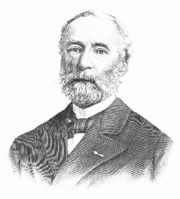
Louis Gustave Vapereau
Encyclopedia

France
The French Republic , The French Republic , The French Republic , (commonly known as France , is a unitary semi-presidential republic in Western Europe with several overseas territories and islands located on other continents and in the Indian, Pacific, and Atlantic oceans. Metropolitan France...
writer and lexicographer
Lexicology
Lexicology is the part of linguistics which studies words, their nature and meaning, words' elements, relations between words , word groups and the whole lexicon....
famous primarily for his dictionaries, the Dictionnaire universel des contemporains and the Dictionnaire universel des littérateurs.
Biography
Born in OrléansOrléans
-Prehistory and Roman:Cenabum was a Gallic stronghold, one of the principal towns of the Carnutes tribe where the Druids held their annual assembly. It was conquered and destroyed by Julius Caesar in 52 BC, then rebuilt under the Roman Empire...
, Louis Gustave Vapereau studied philosophy
Philosophy
Philosophy is the study of general and fundamental problems, such as those connected with existence, knowledge, values, reason, mind, and language. Philosophy is distinguished from other ways of addressing such problems by its critical, generally systematic approach and its reliance on rational...
at the École Normale Supérieure
École Normale Supérieure
The École normale supérieure is one of the most prestigious French grandes écoles...
from 1838 to 1843, writing his thesis on Pascal
Blaise Pascal
Blaise Pascal , was a French mathematician, physicist, inventor, writer and Catholic philosopher. He was a child prodigy who was educated by his father, a tax collector in Rouen...
's Pensées
Pensées
The Pensées represented a defense of the Christian religion by Blaise Pascal, the renowned 17th century philosopher and mathematician. Pascal's religious conversion led him into a life of asceticism, and the Pensées was in many ways his life's work. "Pascal's Wager" is found here...
under the supervision of Victor Cousin
Victor Cousin
Victor Cousin was a French philosopher. He was a proponent of Scottish Common Sense Realism and had an important influence on French educational policy.-Early life:...
. He taught philosophy at Tours
Tours
Tours is a city in central France, the capital of the Indre-et-Loire department.It is located on the lower reaches of the river Loire, between Orléans and the Atlantic coast. Touraine, the region around Tours, is known for its wines, the alleged perfection of its local spoken French, and for the...
until the establishment of the Second French Empire
Second French Empire
The Second French Empire or French Empire was the Imperial Bonapartist regime of Napoleon III from 1852 to 1870, between the Second Republic and the Third Republic, in France.-Rule of Napoleon III:...
in 1852, when his republican principles cost him his position.
Vapereau returned to Paris
Paris
Paris is the capital and largest city in France, situated on the river Seine, in northern France, at the heart of the Île-de-France region...
to study law, and in 1854 joined the French bar
Bar association
A bar association is a professional body of lawyers. Some bar associations are responsible for the regulation of the legal profession in their jurisdiction; others are professional organizations dedicated to serving their members; in many cases, they are both...
. He did not engage in any legal practice and returned to writing shortly afterwards. In 1858, he published the Dictionnaire universel des contemporains and from 1859 to 1869 he edited the L'Année littéraire et dramatique.
After the collapse of the Empire, Vapereau was appointed prefect
Prefect
Prefect is a magisterial title of varying definition....
of Cantal
Cantal
Cantal is a department in south-central France. It is named after the Cantal mountain range, a group of extinct, eroded volcanic peaks, which covers much of the department. Residents are known as Cantaliens or Cantalous....
on 14 September 1870 by Jules Trochu's Government of National Defense. He then became prefect of Tarn-et-Garonne
Tarn-et-Garonne
Tarn-et-Garonne is a French department in the southwest of France. It is traversed by the Rivers Tarn and Garonne, from which it takes its name.-History:...
from 26 March 1871 until 15 February 1873, when, under pressure from the Catholic church, he was released from the prefecture. He also assembled the Dictionnaire universel des littérateurs, publishing it in 1876. From January 1877 to 1888 he was named inspector-general of public elementary schools.
Vapereau was the author of some excellent editions of the classics, and of works on political and social questions, but he is famous for his two dictionaries. He also contributed to a number of journals, including Revue de l'instruction publique, Revue française, Le Petit Journal and L'Illustration. At the time of his death at Morsang-sur-Orge
Morsang-sur-Orge
Morsang-sur-Orge is a commune in the southern suburbs of Paris, France. It is located from the center of Paris.Inhabitants of Morsang-sur-Orge are known as Morsaintois.-Transport:...
(Essonne
Essonne
Essonne is a French department in the region of Île-de-France. It is named after the Essonne River.It was formed on 1 January 1968 when Seine-et-Oise was split into smaller departments.- History :...
) in 1906, he had been a regular contributor to L'Illustration for twenty-six years, with some of his notes written for the journal being collected and published in 1896 as L'Homme et la vie.
External links
- Entry at Les archives Émile Zola – in French

